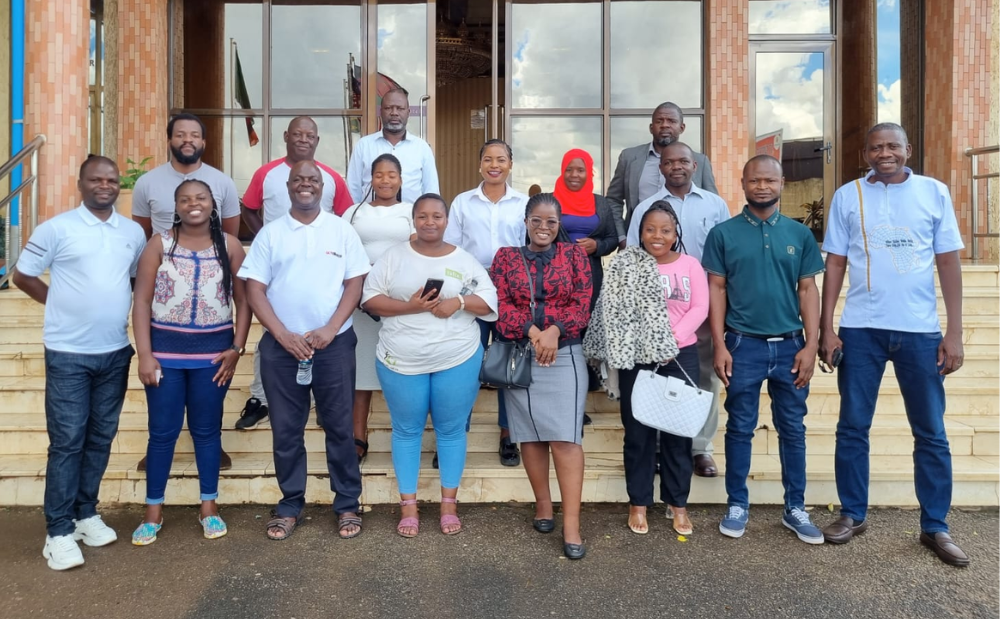SAFCEI hosts FLEAT Malawi follow-up workshop
- Published:

We hosted a FLEAT follow-up workshop for FLEAT Malawi I and II cohorts at Simama Hotel in Lilongwe from 5-7 March 2024, with 21 faith leaders (7 women, 14 men) from all regions in Malawi. Representing Muslim and Christian denominations, the FLEAT Malawi workshop covered the Action Learning Cycle, Appreciative Inquiry, participant reporting, discussions on Cage-Free Egg production, Agroecology, the impact of agriculture on the Climate Crisis, Advocacy Strategies, Energy Justice presentation, and planning in thematic groups. It was the first FLEAT follow-up workshop in this format and it was a success!
Based on the pre-workshop requirements, the participants shared their activities and contributions to environmental care and sustainable consumption. The participants also had expectations from this workshop and they showed this through engagement throughout the three days. The desire to learn from others stood out.
In order to encourage peer learning, we facilitated a Group Reflection with an Appreciative Inquiry exercise- to “appreciate what we are doing and our efforts.” We discussed: What has been the highlight/achievement in the past few months in terms of eco-justice or local actions/ campaigns and shared Change Stories.
Given the opportunities to share their experiences, Faith leaders highlighted wide-ranging activities, mainly centred around tree planting along the rivers for energy woodlots, conducting training on sustainable consumption, food production and cooking demonstrations. We also had a demonstration on the sustainable use of biomass as one means for energy-saving as well as a case study of an arts festival in Blantyre, where artists were made aware of the climate change induced loss and damage.
Organic fertiliser-making and production of manure from maize stocks were other activities that faith leaders trained their communities on as a way of moving away from chemical production and reducing greenhouse gas emissions. Other activities targeted training school clubs on climate justice and also girls on issues of food.
Some linkages were established in these presentations as various participants noted relationships in the activities that they were involved in. We hope that strategic partnerships will form in the country. Faith Leaders noted that the adoption of green energy in Malawi is a challenge. It will be vital to tell people about the advantages of green energy apart from relying on the grid and firewood and to encourage participants to work with the Minister of Natural Resources, Chiefs, and the local municipalities in attaining environmental justice.
The faith leaders were asked to share a moment when they were most inspired in the last few months- where faith, earth, and human connection aligned for eco-justice work. Three faith leaders shared stories of eco-justice work.
On day one, the faith leaders presented lessons from their regional group work. The work covered; food, energy, water, waste management, manure making, tree planting, and disaster risk management. The faith leaders had a wide reach for their work, covering mosques, congregations, villages and municipalities and some regional and national radio audiences. Some faith leaders managed to get funding for their projects using information they gained from FLEAT training. Faith leaders further discussed community mobilisation and agreed that it was a very important component of their work to bring about change.
A presentation by Happy Mbewe on a tree planting project was the highlight of the day. He noted that the project added beekeeping and production of soya milk to involve more people and improve livelihoods. The project involved all age groups and had a motto “A greener earth is possible, it just needs a heart” - Happy Mbewe
Day two presentations were shared by Zwelisha Shobede on Cage Free Hens, Gabriel Manyangadze on Agroecology and The Impact of Climate Change on Food Security. Maia Nangle presented on Advocacy Strategies and Energy and Ngoni made a presentation that was fused with theatre indicating the impact of climate crises in Malawi.
On day three, Geoffrey Manasseha presented on the Erosion of African Culture: Source of Challenges. He noted the abandonment of African Indigenous foods in preference of exotic foods. It was then agreed that people must group according to their areas of interest and involvement. This led to thematic groupings as follows: Food and the Food Systems, Waste Management, and Energy. Each of the three thematic groups came up with plans going forward that included reporting back to their faith communities and tackling awareness and advocacy in their respective themes. The faith leaders evaluated the training workshop expressing appreciation for the opportunity to share experiences and lessons together.
By Gabriel Manyangadze
Who we are

SAFCEI (Southern African Faith Communities’ Environment Institute) is a multi-faith organisation committed to supporting faith leaders and their communities in Southern Africa to increase awareness, understanding and action on eco-justice, sustainable living and climate change.
Featured Articles
-

South Africa: Who Ends Up Paying If DMRE Cooks the Price of Nuclear Power?
-

South Africa’s nuclear energy expansion plans continue to draw criticism, environmental NGOs chew over legal challenge
-

Earthlife Africa and SAFCEI respond to latest unsettling nuclear news regarding the ministerial determination
-

Open Wing Alliance Africa (Virtual) Summit 2023
-

The Green Connection and SAFCEI respond to energy minister's divisive and deflecting comments
-

Job Vacancy: FLEAT Coordinator







